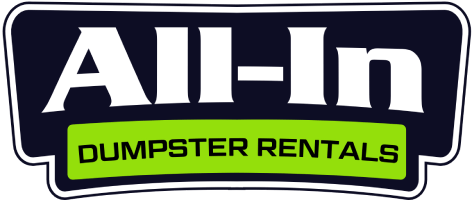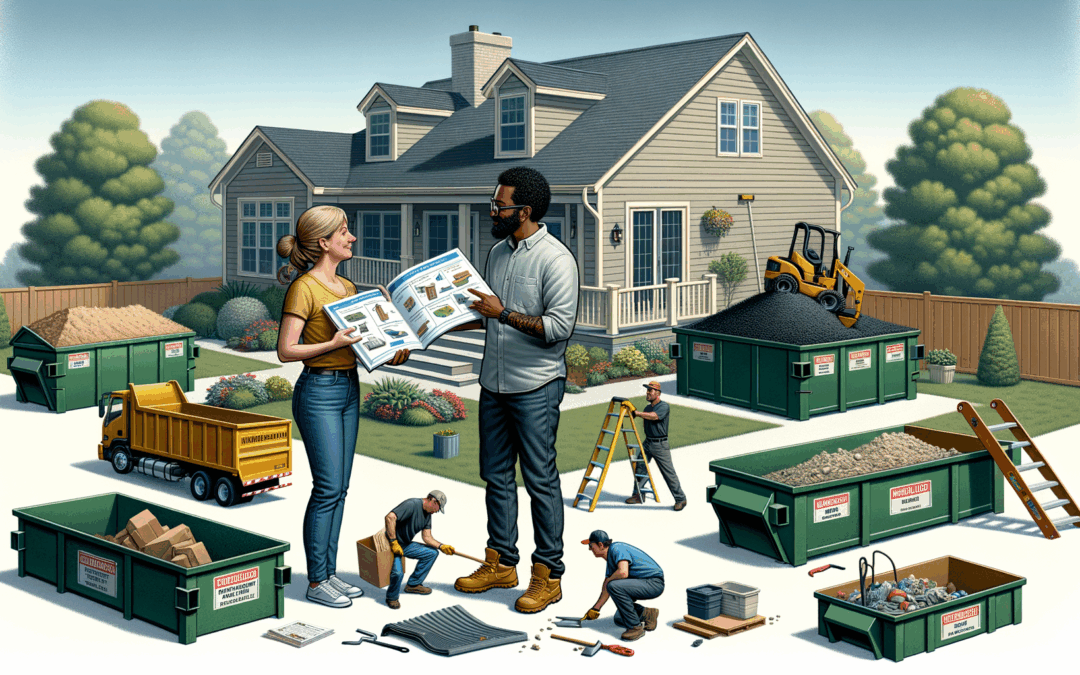Why Proper Waste Management Matters for Asheville’s Landscaping Projects
When it comes to tackling landscaping projects in Asheville’s unique mountain terrain, having the right waste disposal strategy isn’t just convenient—it’s essential. Our lush, green surroundings here in Western North Carolina create both stunning natural beauty and unique waste management challenges that many homeowners don’t consider until they’re knee-deep in yard debris.
As a local dumpster provider serving Buncombe County and surrounding areas, we’ve seen firsthand how proper waste management can transform a chaotic yard renovation into a smooth, efficient project. The right dumpster makes all the difference between spending your weekend hauling countless bags to the curb or focusing on creating the outdoor space you’ve been dreaming about.
Walking through Asheville neighborhoods like Montford, West Asheville, or the winding roads of Haw Creek, you’ll notice how our local landscaping reflects our region’s natural beauty. But maintaining these spaces requires regular upkeep and occasional major overhauls—all generating significant yard waste that needs proper handling.
Understanding Yard Waste Types in Western North Carolina
Before selecting the perfect dumpster for your landscaping project, it’s important to understand what constitutes yard waste in our region and how different seasons affect what you’ll be disposing of.
Asheville’s seasonal changes create distinct types of yard waste throughout the year. During spring and summer, you’re likely dealing with grass clippings, weeds, brush, and plant trimmings. Fall brings those beautiful but abundant leaf piles that blanket our yards. Winter often involves removing dead branches or even entire trees damaged by ice storms.
Beyond the seasonal variations, landscaping projects generally produce several categories of waste:
Green waste includes fresh plant material like grass clippings, fresh leaves, and plant trimmings. This material tends to be wet, heavy, and decomposes quickly.
Woody waste consists of branches, stumps, and trunk materials that are much denser and often require special handling due to their weight and size.
Soil and stone waste comes from excavation, terrace building, or garden bed reconstruction—common in our hilly terrain where many homeowners create terraced gardens to work with Asheville’s topography.
Mixed landscaping waste might include old garden fixtures, broken pottery, worn-out garden hoses, or plastic plant containers along with organic materials.
Why a Dedicated Dumpster Makes Sense for Landscaping Projects
Many homeowners underestimate the volume of waste generated by even modest landscaping projects. What starts as “just a few shrubs to remove” quickly turns into a mountain of debris that overwhelms standard disposal options.
I remember a customer in North Asheville who planned to refresh her garden beds and thought she could manage with regular curbside pickup. Three weeks later, she called us somewhat desperately as green waste bags lined her driveway, with more accumulating daily. The city’s limited yard waste collection couldn’t keep pace with her project timeline.
A dedicated dumpster for your landscaping project offers several key advantages:
It provides a central collection point that keeps your work area clean and safe throughout the project. Rather than creating multiple debris piles or filling countless bags, everything goes directly into the dumpster.
It eliminates multiple trips to disposal facilities, saving you time and vehicle wear. Considering the distance to Buncombe County landfill facilities from many Asheville neighborhoods, this convenience is significant.
It allows you to complete your project on your schedule rather than timing work around municipal pickup days—especially important given our unpredictable mountain weather patterns.
Choosing the Right Size Dumpster for Your Landscaping Project
Selecting the appropriate dumpster size is perhaps the most critical decision for effective yard waste management. Too small, and you’ll find yourself needing a second delivery (and paying twice). Too large, and you’re paying for space you don’t need.
Here in Asheville, we offer three main dumpster sizes, each suited to different landscaping scenarios:
Our 10-yard dumpsters work well for smaller projects like refreshing garden beds, removing a few shrubs, or managing seasonal cleanup. These compact units fit easily in most driveways without overwhelming the space, making them perfect for homes in neighborhoods like Kenilworth or parts of East Asheville with limited outdoor space.
For medium-sized projects, our 13-yard dumpsters provide additional capacity without requiring significantly more space. These are ideal for complete garden overhauls, removing several large shrubs, or clearing overgrown areas—common when people purchase one of Asheville’s charming older homes that may have suffered from landscape neglect.
When tackling major landscape transformations, our 15-yard dumpsters offer the maximum capacity. These are appropriate for projects involving multiple tree removals, complete yard renovations, or clearing heavily wooded areas for new landscaping installations—something we see frequently in the more wooded properties around Asheville’s outskirts.
Special Considerations for Yard Waste in Asheville
Our mountain environment creates some unique factors to consider when disposing of landscaping waste:
Weight limitations are particularly important with yard waste. Soil, stones, and even wet plant material can quickly exceed weight restrictions for dumpsters. When we drop off a dumpster, we always discuss weight guidelines and help customers understand how to distribute heavy materials appropriately.
Invasive species management is a growing concern in Western North Carolina. Plants like kudzu, Japanese knotweed, and certain ivy species should be disposed of carefully to prevent spread. Our team can provide guidance on proper disposal methods for these problematic plants that threaten our local ecosystems.
Weather considerations affect landscaping projects significantly in our climate. Rainy periods can make yard waste significantly heavier, while drought can make certain materials more prone to creating dust during handling. We help customers plan accordingly for these seasonal variations.
Loading Tips for Landscaping Materials
How you load your dumpster can make a significant difference in how much material you can fit and how easily it can be transported. After years of helping Asheville residents with their landscaping projects, we’ve developed some practical loading strategies:
Start with bulky, branchy items at the bottom. They’ll compress under the weight of other materials, creating more space. This works particularly well with the brushy undergrowth that’s common in our mountain landscape.
Distribute weight evenly throughout the container. This is especially important when disposing of rocks or soil from terracing projects that are common in our hilly terrain.
Break down larger items when possible. Cutting branches into smaller sections allows for more efficient packing and helps meet length restrictions (typically 4-5 feet maximum).
Fill gaps with smaller debris like leaves or grass clippings. This maximizes your available space and prevents lightweight materials from blowing away—important on our breezy mountain ridges.
Avoid overfilling the dumpster above the rim. Material should not extend above the sides of the container for safe transport on Asheville’s winding roads.
Sustainable Yard Waste Management in Asheville
Sustainability is a core value for many Asheville residents, and thoughtful yard waste management aligns perfectly with this philosophy. Before putting everything into a dumpster, consider these eco-friendly alternatives for portions of your yard waste:
Composting appropriate materials can transform them into valuable garden resources. Leaves, grass clippings, and small plant trimmings can nourish next year’s garden instead of being hauled away. Many Asheville homes maintain compost systems that complement their gardening practices.
Mulching fallen leaves or small branches can provide free mulch for garden beds, reducing water needs and suppressing weeds. This practice is particularly valuable in our region where summer drought periods are becoming more common.
Donating usable plants is another option. When removing healthy plants during redesign projects, consider offering them to neighbors or through local gardening groups. The vibrant gardening community in Asheville ensures that many plants can find new homes rather than ending up as waste.
For materials that must be disposed of, we ensure they’re handled responsibly. Much of the yard waste collected in Asheville is processed into mulch or compost at regional facilities rather than simply being landfilled—part of our commitment to sustainable practices.
Planning Your Landscaping Project Timeline
Successful landscaping projects in Asheville require thoughtful planning, especially regarding waste management. Here’s a timeline approach we recommend to our customers:
One week before: Finalize your project scope and arrange for dumpster delivery. This allows you to have the container in place exactly when you need it—especially important during spring and fall when our rental calendar fills quickly.
Project start: Have your dumpster delivered the day before or morning of your project start. Position it strategically for easy access from all work areas without blocking critical pathways or creating safety hazards.
Throughout the project: Load waste as you go rather than creating temporary piles. This keeps your work area clean and prevents double-handling of materials, which is particularly helpful on Asheville’s often sloped properties where moving debris uphill can be exhausting.
Project completion: Schedule pickup promptly after finishing to free up your space. During busy seasons like spring in Asheville, scheduling in advance ensures timely service.
Cost Considerations for Landscaping Dumpsters
Budget planning is an important aspect of any home improvement project. When it comes to dumpster rental for landscaping work, several factors affect pricing:
Rental duration impacts overall cost. While standard rentals typically run 7-10 days, we understand that Asheville’s sometimes unpredictable weather can delay outdoor projects. We offer flexible scheduling to accommodate these realities.
Dumpster size naturally affects pricing. While larger containers cost more, they can be more economical than renting multiple smaller units for big projects. We help customers accurately assess their needs to find the most cost-effective option.
Weight of materials significantly impacts costs since disposal fees are often weight-based. We provide clear weight guidelines and help customers understand how to estimate the weight of their specific landscaping waste.
Seasonal timing can sometimes affect availability and pricing. Spring and fall are particularly busy seasons for landscaping in Asheville, so booking in advance is advisable during these peak times.
Real Examples from Asheville Neighborhoods
Throughout Asheville’s diverse neighborhoods, we’ve helped countless homeowners manage landscaping waste effectively. Here are a few real examples that might resonate with your project:
In Kenilworth, a homeowner reclaimed a backyard that had become overgrown with invasive bamboo. The project generated an enormous amount of dense, woody waste. A 15-yard dumpster provided adequate capacity for the bamboo removal phase, allowing the family to transform their unusable yard into a functional outdoor living space.
Over in Montford, where historic homes often feature mature landscaping, a family needed to remove several large, aging shrubs that were damaging their foundation. A 13-yard dumpster accommodated both the woody waste and the soil excavated during the removal process.
In a newer development in South Asheville, a homeowner starting from scratch with basic builder-grade landscaping used a 10-yard dumpster to manage waste while installing garden beds, planting trees, and creating a natural play area for children. The central waste collection point kept their property safe and organized throughout the multi-week project.
Making Your Landscaping Vision a Reality
Your outdoor space should be as beautiful and functional as your home’s interior, especially here in Asheville where outdoor living is such an important part of our lifestyle. The right waste management approach helps make that vision achievable without the stress and chaos that improper disposal creates.
As you plan your next landscaping project—whether it’s a simple garden refresh or a complete yard transformation—remember that proper waste management isn’t an afterthought but an integral part of project planning. The right dumpster, delivered when you need it and picked up promptly when you’re finished, makes the entire process smoother and more efficient.
Here in the beautiful mountains of Western North Carolina, we’re fortunate to live surrounded by natural beauty. With thoughtful planning and the right resources, your yard can echo that beauty while remaining manageable and enjoyable. That’s what proper waste management contributes to—not just cleanliness, but creating spaces where Asheville families can fully enjoy our remarkable mountain setting.
Ready to start your landscaping project with the right waste management solution? We’re here to help with the local expertise and personal service that only a family-owned Asheville business can provide.

